March 2024
inside this issue:
• It’s Careers in Aging Month! 2
• Older Americans Month 4
Butler-Williams Scholars Program Welcomes
Applications
The National Institute on Aging (NIA) has issued a call for applications for its Butler-Williams Scholars Program, which provides unique opportunities for junior faculty, researchers new to the field of aging, and postdoctoral fellows to gain insight about aging research. The program offers a variety of perspectives and includes presentations, seminars, and interactive small group activities and discussions.
The 2023 program will be held virtually from August 21 to 23. Participation is free for successful applicants. Qualified applicants must hold a doctoral degree (DrPH, PhD, MD, etc.); be currently involved in or actively considering a move to the field of aging research; and be a U.S. citizen or permanent resident. Applications are due April 19.
New
GSA Publication Addresses Dementia Care in Adults with I/DD
Addressing Brain Health in Adults With Intellectual Disabilities and Developmental Disabilities: A Companion to the KAER Toolkit for Primary Care Providers is a new publication from GSA designed to address the needs of adults with intellectual and developmental disabilities (I/ DD) who develop dementia. Freely available at geron. org/brainhealth, this companion document:

• Raises awareness of unique needs of adults living with I/DD.
• Equips and encourages caregivers and health care teams to engage in appropriate brain health conversations with adults with I/DD.
Engage
http://connect.geron.org
www.facebook.com/ geronsociety
www.twitter.com/ geronsociety
• Promotes brain health conversations and early detection of changes in cognitive and adaptive function for adults with I/DD.
• Assists with the identification of community supports and resource networks aimed at enhancing function and quality of life for adults with dementia and I/DD.
It complements the GSA KAER Toolkit for Primary Care Teams, which is based on a four-step framework for addressing brain health in adults:
• Kickstart the brain health conversation
• Assess for cognitive impairment
• Evaluate for dementia
• Refer for community resources
Continued on page 6
Bridging Continents: A GSA Delegation’s Journey to China
Recalling the vibrant theme of last year’s GSA Annual Scientific Meeting in Tampa, “Building Bridges > Catalyzing Research > Empowering All Ages,” I want to share experiences during a recent trip to China in furthering these principles.
By Board Chair James F. Nelson, PhD, FGSA

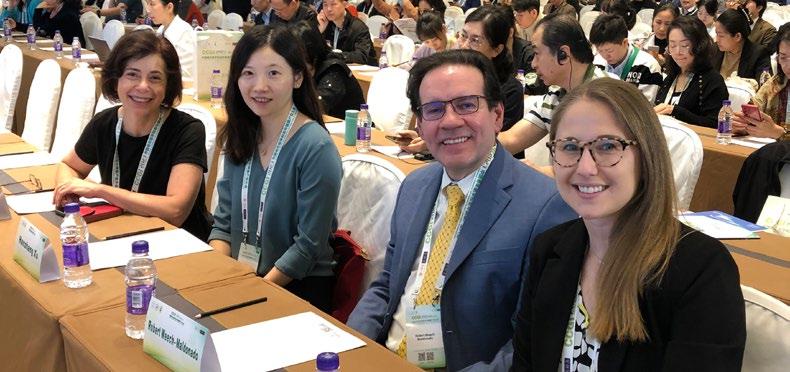
The organizing committee of the Chinese Congress on Geriatrics and Industry invited me and four GSA members to represent the Society at their annual meeting last November in Haikou, a beautiful city on the tropical island of Hainan, just off the southern coast of China. This was an invaluable opportunity not only to showcase our multidisciplinary aging research, but also to share the many initiatives through which GSA empowers its members and enriches the lives of those we serve.
Our delegation, selected following a call for abstracts, reflected the multidisciplinary spectrum of GSA’s membership sections and represented a diverse array of expertise in gerontology.
Elham Mahmoudi, PhD, of the University of Michigan (Behavioral and Social Sciences Section) presented work on improving dementia care by reducing adverse health events; Allyson K. Palmer, MD, PhD, of the Mayo Clinic (Biological Sciences Section) discussed her work on cell senescence and delirium; Robert
Continued on page 7
gerontology news
JOIN THE CONVERSATION
with GSA on social media!
Nelson Mahmoudi, Xu, Weech-Maldonado, Palmer

From the CEO
It’s Careers in Aging Month — Let’s Spread Awareness Together
By James Appleby, BSPharm, MPH • jappleby@geron.org
For more than two decades GSA has celebrated careers in aging each spring with a dedicated week of activities. Now in recognition of the importance of the many professions in our field, we’re launching Careers in Aging Month in 2024!
Throughout March, GSA will help individuals, educational institutions, and organizations be the strongest advocates and influencers for careers in aging. We will build awareness with college students and even high school students that there are aging careers and programs that can help them reach their educational and professional goals. We will recognize and share appreciation for researchers, clinicians, educators, and the extended network of aging professionals, caregivers, and staff already working in the field. And the activities will include the promotion of numerous disciplines and careers, including direct service, research, and education.
And we’ve adopted a new tagline, “Passion. Purpose. Possibilities.” Visit careersinaging.com to learn how you can become involved and discover our many resources to help you be successful.
Working with partners, our goal is for Careers in Aging Month to be observed by businesses, clinics, coalitions, organizations, universities, colleges, health care providers, and other parties across the U.S. and worldwide.
We’re honored to be joined in our efforts this year by GSA’s Academy for Gerontology in Higher Education (AGHE), GSA’s National Center to Reframe Aging, the American Federation for Aging Research, the American Health Care Association, Argentum, the Erickson School of Aging Studies at the University of Maryland, Baltimore County, Minnesota HOSA, and LeadingAge and LeadingAge Kansas.
This is the first year we’ve partnered with Minnesota HOSA, a state chapter of the global student-led organization HOSA—Future Health Professionals. HOSA was previously known as the Health Occupations Students of America. Its mission is to empower individuals to become leaders in the global health community.
We expanded from a week to a month to give participants the opportunity to hold
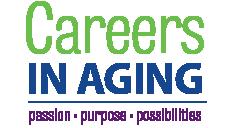
activities in a wider timeframe and for us to promote the wide range of gerontologyrelated vocational opportunities. For example, we’ll explore health care in the first week, education, research, and advocacy in the second week, business and entrepreneurship in the third week, and home and community services in the fourth week.
GSA invites you to join the several online panel discussions we have lined up: “Working with Wisdom: Social Work Careers in Aging” on March 14 in partnership with the Association for Gerontology Education in Social Work and the Council on Social Work Education; “Careers in Aging: Policy Careers” on March 15 in partnership with the Health and Aging Policy Fellows Program; “Teaching Tips and Tricks: Learn from Instructors From Various Career Stages” on March 27 organized by AGHE. And on March 26, we’ll host a Career Conversation, “Utilizing GSA Interest Groups to Advance Your Career and Find Your People.” Check out GSA’s online calendar of events for our full programming schedule.
Although we amplify our activities in March, GSA is dedicated to the promotion of careers in aging year-round. For example, we now offer free undergraduate memberships to students at accredited institutions. For the past five years, we’ve had a summer policy internship program that offers graduate students an immersive experience in Washington, DC. And we now offer a free day of programming at our Annual Scientific Meeting that invites local undergraduate students to participate.
GSA is proud to lead this recognition for all those working in our field now and in the future. And I invite you to sponsor activities at your own institution — your participation allows people to see the diverse career paths in the field of aging!
Volume 52, Issue 3, March 2024
editor-in-chief/lead author: Todd Kluss tkluss@geron.org
managing editor: Karen Tracy ktracy@geron.org
associate editor: Megan McCutcheon mmccutcheon@geron.org
circulation worldwide: 5,000
letters to the editor: We will publish letters to the editor in response to issues raised in the newsletter. Please limit letters to no more than 350 words. Letters should include the writer’s full name, address, and telephone number. Letters will be accepted or rejected at the sole discretion of the editors and may be edited for clarity or space. Send to: tkluss@geron.org
Gerontology News (ISSN 1083 222X) is published monthly by the Gerontological Society of America, 1101 14th Street NW, Suite 1220, Washington, DC 20005 and additional mailing offices. Subscription for members of the Society is included in annual dues. News items must be submitted by the first of the month prior to publication.
Copyright © 2024 by the Gerontological Society of America. Articles may be photocopied for educational purposes without permission. Please credit Gerontology News.
Send news items to: tkluss@geron.org
Send advertisements to: advertising@geron.org
Ad rates are available at www.geron.org
Advertising policy: Gerontology News accepts ads for conferences and special events, fellowships, jobs, and degree programs relevant to the field of aging. We reserve the right to reject or discontinue any advertising. Ads do not constitute an endorsement by the Gerontological Society of America.
2 • March 2024 • gerontology news
gerontology news
In Memoriam
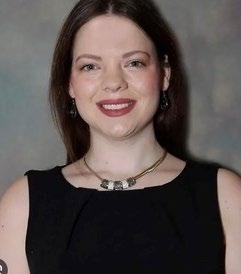
GSA Minority Issues in Gerontology Advisory Panel member Ginny “Virginia” Leigh (Little) Natale, PhD, MS, passed away on November 10 at age 35. She earned her PhD in medical sociology from Kent State University, and continued her efforts at research positions with the Research Foundation for the State of New York and Stony Brook University Division of Preventative Medicine and Population Health. She shed light on the ways in which societal factors influence the experience of Alzheimer’s disease and related dementias.
In addition to her service on GSA’s advisory panel, Natale was accepted as a 2020-2021 participant in the GSA Diversity Mentoring & Career Development Technical Assistance Workshop. She also was the recipient of several National Institutes of Health grants.
Members in the News
• On January 17, Eileen Crimmins, PhD, FGSA, was quoted in a Wall Street Journal article titled “Your Healthspan Is as Important as Your Lifespan—and It’s Declining.”
• Karen D. Lincoln, PhD, FGSA, was quoted in a January 23 Forbes article titled “Older Adults Embracing Technology, AARP Reports,” and a February 5 article in The New York Times titled “After Police Kill Unarmed Black People, Sleep Worsens — but Only for Black People.”
• On January 27, Mushira Khan, PhD, was quoted in an IndiaCurrents article titled “ Where Are My Mother’s Teeth? Language Barriers Limit Seniors’ Access To Healthcare.”
• On January 27, Karen Tracy was quoted in a Main Street Daily News article titled “Aging Matters: Vaccine debate continues among seniors.”
• On January 30, Jeannette Mahoney, PhD, was quoted in a Caregiving Magazine article titled “Studies show that hearing loss increases a person’s risk of falling. Why might that be — and what can you do about it?”
• On February 5, Luigi Ferrucci, MD, PhD, FGSA, and Matt Kaeberlein, PhD, FGSA, were featured in an NPR “Morning Edition” story titled “You can order a test to find out your biological age. Is it worth it?”
Member Spotlight
GSA’s website features monthly Q&A sessions with distinguished members. The current spotlight shines on: Elizabeth Vásquez, DrPH, FGSA
Member Referral Program
This month’s $25 Amazon gift certificate winner: Trinidad Arguelles, EdD The recipient, who became eligible after referring new member Amelia Guzman, was randomly selected using randomizer.org. For more details on the Member Referral Program visit: www.geron.org/referral
Moore Named Vice President at Westat
Terry Moore, MPH, BSN, FGSA, a three-decade health services research and business development leader, assumed the role of vice president of innovation and quality at Rockville, Maryland-based research and professional services provider Westat on January 1. In this capacity, she will lead and improve processes to align the company with industry best practices across the areas of quality assurance, talent development and project and risk management to meet the requirements of customers. Moore most recently served as a senior adviser and mentor at Westat Insight, where she led business development efforts and health services research projects. She is a former vice president of domestic health policy at Abt Associates.
Calkins Earns Who’s Who Status
Margaret “Maggie” Calkins, PhD, EDAC, FGSA, has been inducted into the Marquis Who’s Who biographical registry. She is recognized for her outstanding contributions to the field of environments for aging individuals and those living with dementia.
Calkins currently is the board chair and senior researcher at IDEAS Institute, an independent research organization focusing on person-centered environments for older adults and individuals living with dementia.
AASWSW Inducts Aranda, Jang
María P. Aranda, PhD, MSW, MPA, LCSW, FGSA, and Yuri Jang, PhD, FGSA, were inducted into the American Academy of Social Work and Social Welfare (AASWSW) for 2024 at a ceremony in Washington, DC, on January 13. The AASWSW recognizes the accomplishments of scholars, practitioners and policy leaders dedicated to achieving excellence in high-impact work to advance social good.
Aranda is the Margaret W. Driscoll/Louise M. Clevenger Professor in Social Policy and Administration at the University of Southern California (USC) Suzanne Dworak-Peck School of Social Work and executive director of the USC Edward R. Roybal Institute on Aging. Yang, a former GSA secretary, is a professor and the USC Golden Age Association/Frances Wu Chair in Chinese Elderly at the USC Suzanne Dworak-Peck School of Social Work, and a senior scientist at the USC Edward R. Roybal Institute on Aging.
Butler Honored by University of Maine
Sandra Butler, PhD, FGSA, has been named the 2024 Distinguished Maine Professor, the University of Maine’s most prestigious faculty accolade. A professor and director of the university’s School of Social Work, Butler will be honored at the Alumni Achievement Awards Dinner and Celebration on April 26. The annual award honors a professor who exemplifies the highest qualities of teaching, research, and public service. Butler is a long-time educator and leader in social work, whose research and advocacy has influenced state and federal policy. In 2020, she became director of the school after intermittently serving as interim or acting director for several years. She became the coordinator of the Master of Social Work program in 2006 — the same year she was promoted to professor — and has served as its coordinator ever since.
March 2024 • gerontology news • 3 member
news
Natale
By GSA Policy Advisor Brian W. Lindberg, MMHS
Powered by Connection: Prepare for Older Americans Month
Powered by Connection — What an apt theme for the 2024 Older Americans Month, with social isolation and loneliness becoming better understood in recent years. The Administration for Community Living (ACL) emphasizes that we’ve learned so much about “the profound impact that meaningful relationships and social connections have on our health and well-being.” To prepare you for your efforts in promoting Older Americans Month in May, this column will provide you with updates and resources on the national effort to address social isolation, loneliness, and social connection.
Note these recent statistics:
• U.S.: Post-pandemic research shows 58 percent of Americans experience loneliness — consistent with pre-pandemic rates.
• Global: One in four people globally report feeling lonely
• Older: In 2023, one in three age 50 to 80 reported feeling isolated from others in the past year
• Younger: Gen Z (people born after 1996) is the loneliest generation (79 percent), followed by millennials (born 1981 to 1996) (71 percent)
• Children: School loneliness in the U.S. increased from 18.6 percent in 2000 to 36.6 percent in 2018, with much of the increase occurring after 2012
What are some of the factors fueling these figures? Clearly the pandemic exacerbated the trend. In addition, experts point to the following societal conditions:
• Hyper-individualism. The desire to feel unique can lead to a sense of differentness or separation from others.
• Decline in religious and civic affiliations and memberships.
• Hyper-tailored media presence and consumption. Between sophisticated media algorithms driving what we see on our social media and the “compare and despair” tendency (especially among youth), we can become disengaged from the “real world” and real relationships with all of their imperfections and flaws.
• Overwork and the “hustle culture” leads us to outsource tasks that used to help us connect to our communities. For example, instead of shopping at the local market or restaurant, we opt for a delivery service. When we might have asked a family member or neighbor for help jumpstarting a car, we call AAA. These minor social interactions used to contribute to building a fabric of connectedness in our lives.
• Structural and historic discrimination that broke up neighborhoods and marginalized populations through redlining and highway construction decisions.
• Valuing youth over aging, which leads to physical and emotional distancing from aging, illness, and death and dying.
Many GSA members have contributed to the evidence-base that is foundational to creating a movement to address these societal challenges. GSA is a founding member of the Coalition to End Social Isolation
and Loneliness (CESIL) which was convened in 2018 as an approach to addressing these conditions through policy, advocacy, and awareness activities. The research and analysis published in GSA’s December 2017 Public Policy & Aging Report titled “Lack of Social Connectedness and its Consequences” is still relevant and revealing today.
Since then, CESIL and its sister organization, the Foundation for Social Connection (F4SC), have been developing ways to translate the research into action. The foundation’s Scientific Advisory Council is chaired by GSA member Julianne Holt-Lunstad, PhD, of Brigham Young University and Carla Perissinotto, MD, of USCF Medical Center. The council also includes GSA members Matthew Smith, PhD, of Texas A&M University; Thomas Cudjoe, MD, MPH, of Johns Hopkins University School of Medicine; Louise Hawkley, PhD, NORC (formerly National Opinion Research Center) at the University of Chicago; and Ashwin Kotwal, MD, of the UCSF Medical Center.
In addition, F4SC works closely with Surgeon General Vivek Murthy, MD, MBA, whose office published an advisory in May 2023: Our Epidemic of Loneliness and Isolation: The Surgeon General’s Advisory on the Healing Effects of Social Connection and Community. Lunstad was the advisory’s lead science editor.
A milestone, the advisory marks the first national commitment to a coordinated national strategy for advancing social connection. Its six-pillar framework includes: strengthening social infrastructure, enacting pro-connection public policies, mobilizing the health sector, reforming digital environments, deepening knowledge through research, and cultivating a culture of connection.
This is an important point because it’s tempting to think of loneliness and social isolation as a condition solely attributable to an individual’s actions or lack of actions. According to CESIL vice chair Edward Garcia, “The causes are systemic and broad across the policies, systems and environments in which we live, work, play, and worship. There are things that individuals can do to address our loneliness, but this is both about the human spirit and the policies and structures of our civil society.”
Recent Developments
In September 2023, F4SC released the Action Guide for Building Socially Connected Communities. Their site explains, “Developed for local change makers and leaders… It includes a stepwise process to engage partners and community members, identify priorities, create a plan, and measure results. … The guide also includes research-backed resources and promising strategies for community connection.”
On February 2, San Mateo, California, became the first county in the country to declare loneliness a public health emergency. The action guide and the surgeon general’s six pillars provide an aligned framework for counties like San Mateo to take actions promoting social connection.
Over the last year, F4SC has partnered with the Centers for Medicare & Medicaid Services Quality Improvement Office to design and implement a social connection intervention in Houston. This intervention brings
policy news 4 • March 2024 • gerontology news
together older adults living in nursing homes and medical professional students. Outcomes of interest included reducing social isolation and loneliness in older adults living in nursing homes, increasing knowledge of social connection concepts in medical professional students, and increasing interest of geriatrics in medical professional students. The one-year pilot ends this month, with hopes for expansion.
On February 4, GSA member Ashwin Kotwal, MD, and Carla Perissinotto, MD, MHS, appeared on the popular GeriPal podcast discussing loneliness and social isolation.
On February 24, the PBS NewsHour reported on the “Growing Health Crisis of Loneliness in America” and interviewed Edward Garcia, MHS, vice chair of CESIL’s Board of Directors. Of the many important and thoughtful things Garcia said, what struck me was his emphasis on cultivating a systemic solution:
“We are very concerned about the stigma around loneliness. It’s been thought of as a sort of individual problem, and a lot of people have been scared to come forward to talk about that…while there are absolutely paths forward for individuals to connect, such as joining clubs, finding opportunities for in person connection through shared love of music or other activities. We really want to focus on systemic, broad-based policies, systems, environmental changes that help support federal, state and national and local strategies to address social disconnection.”
Coming up in June, CESIL partners with the Global Initiative on Loneliness and Connection and Marmalade Trust to highlight Global Loneliness Awareness Week, June 10 to 16, with events held at the Johns Hopkins University Washington DC location. Please refer to these organizations for more information about the week’s events.
Advocacy
A critical part of raising awareness about social isolation and loneliness is advocacy to build and repair the infrastructure in our public health and aging network frameworks. To that end, I ask you to note the following legislation that CESIL is monitoring and supporting in Congress. If you recognize your member of Congress in this list or have a special interest in one of the bills, please contact the legislators to offer support and any research findings or information you have to bolster the advancement of their bills.
CESIL endorsed the following pieces of legislation in the 118th Congress:
• Addressing SILO Act of 2023 H.R. 2692: Representative Linda Sanchez (D-CA)
• National Strategy for Social Connection Act S. 2350: Senator Chris Murphy (D-CT), Senator Tina Smith (D-MN)
• Improving Measurements for Loneliness and Isolation Act H.R. 6284: Representative Mike Flood (R-NE), Representative David Trone (D-MD), Senator Pete Ricketts (R-NE)
• The Higher Education Mental Health Act S.1665: Representative David Trone (D-MD), Senator Bob Casey (D-PA)
• Older Americans Bill of Rights H.Res. 460: Representative Jan Schakowsky (D-IL), Representative Doris Matsui (D-CA)
• The Strategic Plan for Aging Act: Senator Kirsten Gillibrand (D-NY), Senator Bob Casey (D-PA)
• Telemental Health Care Access Act S. 3651: Senator Bill Cassidy (R-LA), Tina Smith (D-MN), Senator John Thune (R-SD), Sen. Ben Cardin (D-MD)
• Credit for Caring Act S. 3702: Senator Michael Bennet (D-CO), Senator Shelley Moore Capito (R-WV), Representative Mike Carey (R-OH), Representative Linda Sanchez (D-CA)
• Community Mental Wellness and Resilience Act S. 1452 / H.R. 3073: Senator Ed Markey (D-MA), Representative Paul Tonko (D-NY), Representative Scott Fitzpatrick (R-PA)
I asked Andrew MacPherson, the founder of CESIL, what he thinks about the status of the movement at this point.
He said, “Since 2018, the coalition and its diverse membership of patient groups, community-based organizations, groups representing older Americans, and major health care stakeholders have worked tirelessly to raise the visibility of social isolation and loneliness in America based on the robust and rapidly evolving evidence-base. We are proud of the bipartisan, bicameral progress that has been made by a range of members of congress from across the country, but more must be done to support people experiencing isolation and loneliness, which is why we continue to advocate for our comprehensive federal policy priorities on a daily basis not just on Capitol Hill but with the Executive Branch as well.”
A note of thanks to CESIL and F4SC teams for providing information for this article.
Recent GSA Policy Actions
GSA submitted a comment letter to the Center for Medicare and Medicaid Services, supporting nominations to clarify Medicare payment policy for dental services that are inextricably linked and substantially related and integral to the clinical success of covered medical services on which Medicare beneficiaries with diabetes and autoimmune disease depend.
GSA, through the Eldercare Workforce Alliance, supported the Integrating Social Workers Across Health Care Settings Act. The bill was introduced in the House of Representative in July 2023 by Representatives Danny Davis (D-IL) and Jen Kiggans (R-VA) and is expected to be introduced in the Senate by Senator Kyrsten Sinema (I-AZ) this year. The bipartisan legislation will improve healthcare and lower costs for patients across America by amending the Social Security Act to allow clinical social workers to fully practice proactive mental healthcare and be reimbursed for that service.
GSA and several other immunization, public health, and medical organizations supported a letter to House and Senate leaders on the Select Subcommittees on the Coronavirus Pandemic, advocating for increased focus on expanding and improving America’s current vaccine safety systems. Vaccine safety monitoring will benefit tremendously from sustained and increased funding, taking advantage of new capacity in big data, understanding the biological mechanisms underlying adverse reactions, and genomics.
Continued policy
news
March 2024 • gerontology news • 5
educational news
Mining Your Own Campus for Geriatrics and Gerontology Education Opportunities
By Rajean Moone, PhD, LNHA, LALD, and Christina Cauble, MBA, LNHA, HSE
At colleges and universities across the globe you will frequently find geriatrics and gerontology education dispersed across academic programs. The complex reasons for this diffusion include tuition payment policies, funding, accreditation requirements, size of the institution, faculty interests, and other factors beyond the control of faculty and staff. At the same time, coordination and collaboration across programs are critical to the fundamental nature of interdisciplinary learning in aging studies. There are strategies that support student-centered, interdisciplinary learning as well as strategically align academia across programs.
First, start by mining your institution’s website with keyword searches relevant to aging studies such as older adults, geriatrics, gerontology, senior, aging, long-term care, disability, and lifespan. From there you can compile a list of schools, programs, centers, and institutes related to aging studies. Keep track of these in an organized way, making sure to indicate which centers or institutes belong to which schools. You can take this a step further by searching course schedules and course listings with the same terms. These lists can be shared with community partners. At the University of Minnesota, we publish a list of programs in aging studies and each semester the courses that cover topics related to aging. This information is shared on our website as well as with our statewide Gerontological Society who circulate it to members.
Second, reach out to the leaders within the identified programs and instructors of courses. Ask them if they have contacts or know of
anyone else at the university doing work related to older adults, aging, or gerontology or geriatrics. Inquire about their work, and keep in mind opportunities to collaborate. To facilitate conversations, the University of Minnesota created the Consortium on Aging, a collaborative body that hosts all the various centers related to aging studies and research across campuses. This is a great way to keep information current, as things are constantly changing. The consortium meets to strategize ways to advance aging science, education, practice, and policy.
Finally, explore enrollment in the Age-Friendly University Global Network. Age-friendly universities (AFU) provide a catalyst and venue for cross-campus collaborations. At the University of Minnesota, we established an AFU Council composed of stakeholders in aging studies education. The council meets regularly to strategically align our work under a common vision.
By investing time in organizing gerontology and geriatrics education across your campus, you can increase your program’s success through collaboration. You also support student-centered, interdisciplinary learning by helping break down silos across academic units and increasing access. Although the driving factors contributing to the scattered offerings in aging studies are unlikely to change, it is possible to influence partnership and collaboration on your campus. It takes time and consistency to see the fruit of these labors, but the doors it can open for mutually beneficial relationship building is well worth the effort.
Continued from page 1 - New GSA Publication Addresses Dementia Care in Adults with I/DD
Adults with I/DD have a wide range of cognitive and functional capacities that may complicate assessment of cognition. Dementia may be more prevalent and occur in younger ages in certain types of I/DD, particularly Down syndrome. In other conditions, the rate of developing dementia is similar to that of the general population.
“Adults with intellectual and developmental disabilities are a diverse population with complicated needs. This companion document is designed to help health care providers be better prepared to meet these needs and provide brain health care to these individuals,” said Matthew P. Janicki, PhD, co-president of the National Task Group on Intellectual Disabilities and Dementia Practices (NTG) and a member of the advisory board for the companion document.
“Identifying and assessing manifestations of new cognitive impairments or dementia may be complicated because these manifestations may be mistakenly attributed to underlying disability,” added Janicki. “Additionally, cognitive impairment due to other causes, such as a medication change, may not receive a thorough evaluation. Further, in the general population, assessments of cognitive function are typically based on population norms; thus, in most cases, these assessments are not appropriate for individuals who have pre-
existing impairments in cognition or function. Furthermore, there is a paucity of primary care providers or neurological specialists with experience in caring for adults with I/DD.”
The new companion document is intended to help address these gaps in care provided to the I/DD population by supporting direct service providers and medical providers to detect and address changes in function and cognition that might indicate dementia in an adult with I/DD.
“Because of the complexity of the population, it is essential to establish baseline levels of function and cognition for adults with I/DD so that changes can be effectively identified,” said Lucille Esralew, PhD, an NTG board member.
Strategies for assessment and evaluation must also be modified to make them appropriate for adults of varying cognitive and functional capacities. Finally, because adults with I/DD may have needs that differ from the general population, interventions and supports may require adaptations. Details about each of these steps are shared in the companion document.
Collaborating organizations for the development of the companion document include the NTG, the Ohio Association of County Boards of Developmental Disabilities, and the Ohio Council for Cognitive Health. Eisai provided support for the publication.
6 • March 2024 • gerontology news
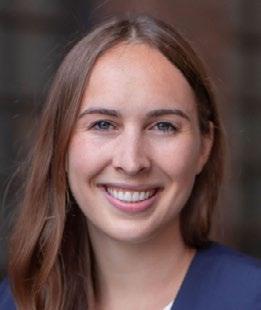
news
The Emerging Scholar and Professional Organization includes all student and transitional members of GSA.
Introducing the 2024 ESPO Newsletter Team
By Molly McHugh, MBE, BSN, RN, Kallol Kumar Bhattacharyya MBBS, MA, PhD, and Claire Grant, MA
Greetings from Molly McHugh, Kallol Kumar Bhattacharyya, and Claire Grant, your incoming ESPO Communications Task Force Newsletter Team members! Our newsletter team continues to grow, and this month, we would like to introduce ourselves. This monthly newsletter brings you news on ESPO programming, activities, and leadership. The Newsletter team is thrilled to have the opportunity to introduce ESPO community updates in upcoming features!
Molly is a fourth-year doctoral candidate in the NewCourtland Center for Transitions and Health at the University of Pennsylvania’s School of Nursing. She received her Bachelor of Science in Nursing from the University of Pennsylvania before working as a critical care nurse. Molly supports the Transitional Care Model (TCM) team evaluating the implementation of the TCM intervention. Molly’s research focuses on social engagement in community-dwelling older adults and their caregivers. She has participated in GSA programming since beginning her doctoral studies and is now looking forward to supporting ESPO as the Communications Task Force Lead.

Kallol is a physician-gerontologist interested in studying health from a biopsychosocial perspective to improve the quality of life of older adults, especially those with dementia, living in the community and long-term care. Kallol completed his PhD from the School of Aging Studies, University of South Florida. Currently, he is extending his research as a post-doctoral fellow in the Alzheimer’s Disease and Dementia Research Center at Utah State University. Kallol is particularly focused on the risk factors and alternative therapeutic interventions for ADRD. He is also interested in the individualized care provided in nursing homes and investigating
how residents’ satisfaction and subsequent complaints (if any) help identify flaws in the care delivery system.
Kallol has been an active member of GSA since 2017. He has several publications in well-known peer-reviewed journals, a book, a book chapter, and many conference presentations. His innovative research has won many awards in scholarly platforms, including GSA, Southern Gerontological Society, Psychologists in Long-Term Care, etc. He is serving in the editorial teams of Gerontology and Geriatric Medicine and PLOS ONE. Finally, Kallol has long clinical, leadership, and administrative experiences from working as a family physician in India before rejoining academia, which will inform practical applications of this position.
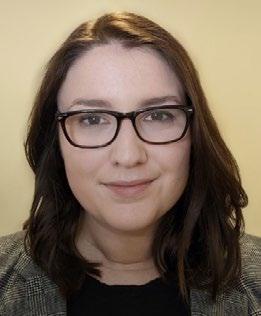
Claire is a fifth-year doctoral student at Cleveland State University. She earned her Master of Arts with a thesis titled “Predicting depression, anxiety, and burden: Self-compassion, selfesteem, and coping in caregivers of individuals with dementia” at Cleveland State University and Bachelor of Arts in psychology at the State University of New York at Geneseo. She is a graduate assistant under Dr. Katherine Judge at Cleveland State and works on a team focused on developing and testing a variety of caregiver focused evidence-based protocols. Claire’s current research interests include family caregiving, the illness experience of living with dementia, applications of self-compassion, and creation and translation of evidence-based protocols.
The team is also excited to share that the abstract submission window is now open for the 2024 Annual Scientific Meeting in Seattle, Washington! The call for abstracts is open until March 14. Check out ESPO on GSA Connect to learn about more opportunities around the upcoming Annual Scientific Meeting.



March 2024 • gerontology news • 7
espo
ADVERTISE WITH US! See the current rates at www.geron.org/advertising. This newsletter reaches GSA’s 5,500 members online. Gerontology News accepts ads for conferences and special events, fellowships, jobs, and degree programs relevant to the field of aging.

Grow your professional network and share industry specific information with thousands of professionals in aging-related fields from around the world.
GSA Connect is an essential tool for members to share resources and research, communicate among networks, and collaborate across different fields in aging. Whether you’re searching for a biologist, a psychologist, an economist, or a social scientist, GSA’s diverse membership spans a variety of disciplines across the globe.
8 • March 2024 • gerontology news
Join our community exclusively for GSA members! Visit Connect.geron.org to start building your network.
journal news
GSA Seeks Next Editor-in-Chief for Innovation in Aging
The GSA Program, Publications, and Products Committee is announcing a search for the position of editor-in-chief of its peerreviewed, fully open access journal, Innovation in Aging. The fouryear contract term for the position will become effective January 1, 2025. Transitions will begin as early as October 2024. The editorin-chief works closely with publishing staff, Editorial Board, and at times directly with authors, reviewers, and readers for the benefit of the journal and the Society. The editor-in-chief proposes the editorial plan and exercises editorial independence in selection of content with advice and guidance provided by the Editorial Board, Oxford University Press, and GSA. The editorship is a voluntary position with an institutional editorial office stipend. Candidates must be dedicated to developing a premier scientific journal.
All nominations and applications must be emailed to Judie Lieu, GSA vice president of publishing and professional resources, at jlieu@geron.org by April 30. Selected candidates will be interviewed by an Editor-in-Chief Search Workgroup in June.
GSA Journals Have Several Open Calls for Papers
The GSA journals regularly invite submissions for special themed issues and sections. Find more information about publishing in
the GSA portfolio, and learn how you benefit from supporting the Society’s vision to ensure we can all enjoy meaningful lives as we age, on our Reasons to Publish page. Browse our open calls for papers below and consider submitting your research to one of our leading journals:
The Journals of Gerontology, Series A: Biological Sciences and Medical Sciences:
• Translational Geroscience (Rolling submissions; no submission deadline)
Innovation in Aging
• A Life Course Approach to Aging and Opioid Use (Abstracts due May 15)
Gerontology & Geriatrics Education
• Diversity, Equity & Inclusion in Gerontology & Geriatrics Education (Manuscripts due June 1)
• Technology and Artificial Intelligence in Gerontological Education (Manuscripts due July 1)
• Education’s Role in Gerontology & Geriatrics Workforce Development (Rolling submissions; no submission deadline)
• Gerontology & Geriatrics Classroom Best Practices (Rolling submissions; no submission deadline)
Maxwell A. Pollack Award for Contributions to Health Aging
The


March 2024 • gerontology news • 9
CONGRATULATIONS TO THE 2023 RECIPIENT: BEI WU, PHD, FGSA, FAGHE, NEW YORK UNIVERSITY This award is funded by The New York Community Trust through a generous gift from Maxwell A. Pollack Fund Nominations are now open through March 31. Scan this code for more information.
Award recognizes an individual whose research, scholarship or practice has generated new or improved policies or practices related to healthy aging.
new resources
NIH Planning Seminar on Diversity in Team Science
The National Institutes of Health (NIH) Chief Officer for Scientific Workforce Diversity (COSWD) will host the second Scientific Workforce Diversity Seminar Series event of the 2023–2024 season, “How Does Diversity Impact Innovation in Team Science?” on March 13, from 10:30 a.m. to 12:00 p.m. ET. This seminar will be held in collaboration with UK Research and Innovation (UKRI) and will offer perspectives on diversity in team science-related data findings from the U.S. and U.K.
NIH COSWD Marie A. Bernard, MD, FGSA, FAGHE, and UKRI Deputy Director for Research Culture and Environment Karen N. Salt, PhD, will moderate the 90-minute discussion. Panelists will describe approaches to improve training, foster inclusive teamwork, and impact leadership in the scientific workforce and the outcomes of this work.
Speakers:
• Tung Nguyen, M.D., Associate Vice Chancellor for Research – Inclusion, Diversity, Equity, and Anti-Racism, University of California, San Francisco
• Kelly Vere, MBE, Director of Technical Strategy, University of Nottingham
• Zanthia Wiley, M.D., FHM, FIDSA, Associate Professor of Medicine, Division of Infectious Diseases, Emory University Hospital Midtown
Reframing Principles Can Be Used in Response to ElectionRelated Ageism
The National Center to Reframe Aging, led by GSA on behalf of 10 aging-focused organizations, has released a new tool, the Responding to Ageist Election Coverage in the Media Guide, that can help people respond to instances of stereotypes, prejudice, and discrimination. This was followed by a webinar, “Addressing Ageism in Election Media Coverage,” featuring Moira O’Neil from the FrameWorks Insitute and John Beilenson from SCP. The two joined GSA Vice President of Policy and Professional Affairs and National Center Executive Director Patricia M. D’Antonio, BSPharm, MS, MBA, BCGP. They discussed reframing strategies to employ when responding to ageist election media coverage and tips for writing effective opinion pieces.
MedPAC and MACPAC Issue Data Dual-Eligibles
The Medicare Payment Advisory Commission (MedPAC) and the Medicaid and CHIP Payment and Access Commission (MACPAC) have released a newly updated data book: “Beneficiaries Dually Eligible for Medicare and Medicaid. This edition describes the dual-eligible population’s composition, service use, and spending in calendar year 2021. This year, we include new data on the overlap in Medicaid and Medicare managed care enrollment.
Dual-eligible beneficiaries receive both Medicare and Medicaid benefits by virtue of age or disability and low income. Key statistics in this year’s data book include:
• There were 12.8 million people who were dually eligible for Medicare and Medicaid for at least one month in 2021.
• People who are dually eligible for Medicare and Medicaid
account for a disproportionate share of spending in both programs. Dual-eligible beneficiaries totaled 19 percent of the Medicare population in 2021 but accounted for 35 percent of Medicare spending. Similarly, dual-eligible beneficiaries accounted for 13 percent of all Medicaid beneficiaries but 27 percent of Medicaid spending.
• Reflecting the continued shift from fee-for-service (FFS) to managed care in Medicare and Medicaid, less than half of dual-eligible beneficiaries (42 percent) were enrolled only in Medicare FFS in 2021, 46 percent were in managed care only, and 13 percent spent part of the year in FFS and part of the year in managed care. For Medicaid services, 42 percent of dual-eligible beneficiaries had at least one month of comprehensive managed care enrollment).
• One-quarter (25 percent) of all dual-eligible beneficiaries had at least one month in which they were simultaneously enrolled in a Medicare managed care plan and a comprehensive Medicaid managed care plan. Another 48 percent of all dual-eligible beneficiaries had some enrollment in Medicare managed care and/ or comprehensive Medicaid managed care but not simultaneously.
AHRQ Aging Roundtable Report Influenced by GSA Members
The Agency for Healthcare Research and Quality (AHRQ) recently released the “Optimizing Health and Function as We Age Roundtable Report,” which explores opportunities such as developing a person-centered care system, and integrating the voices of older adults, caregivers, and communities in designing effective models of care for improving older adults’ health and well-being.
The roundtable brought multidisciplinary experts together, including many GSA members, to discuss how AHRQ can impact and research, dissemination and implementation of evidence to improve the organization and delivery of healthcare with the goal of optimizing health, functional status and well-being of the U.S. population as it ages.
ADRD Care Should Prioritize Equal Access for All, NIA IMPACT Report Says
A new report, “Voices of the Lived Experience Panel: Health Equity in Dementia Care and Research,” summarizes the overarching themes that emerged during four meetings of the National Institute on Aging (NIA) IMPACT Collaboratory’s Lived Experience Panel, the Health Equity Team, and the Engaging Partners Team. The goal of these discussions was to learn about panel members’ lived experiences and insights related to health equity in dementia care and research practices. The report documents a conversational process among panelists. Two major concepts emerged. The first is that people living with Alzheimer’s disease and Alzheimer’s disease-related dementias (AD/ADRD) and their families have different experiences from one another. The second is that there is a need for a broad and inclusive plan to understand and address weaknesses within the systems of care in the U.S., which are often fragmented and lack accountability for health equity.
10 • December 2022 • gerontology news
Continued from page 1 - Bridging Continents: A GSA Delegation’s Journey to China
Weech-Maldonado, PhD, FGSA, of the University of Alabama at Birmingham (Social Research, Policy, and Practice Section) gave a presentation on contextual factors associated with hospice care in the U.S.; and Hanzhang Xu, PhD, RN, of the Duke University School of Nursing (Health Sciences Section) discussed her work on disparities in dementia care from a global perspective.
These presentations not only showcased the breadth of research by our members but also fostered meaningful exchanges with our Chinese counterparts.
The warmth of the reception we received at the meeting was heartening. We had the privilege of connecting with leaders, fellow scientists, and dedicated geriatricians who share our passion and commitment to our common mission. These interactions reinforced the bonds of collaboration and solidarity that underpin our collective efforts in advancing gerontological research, education, and practice everywhere.
Particularly gratifying was our hosts’ interest in understanding the structure and workings of GSA and its impact on aging research. It was an honor to be invited to give a keynote address to the attendees. Of the four topics I suggested — including basic research sex differences in aging and the impact of drug development on aging — the organizers opted for a presentation on the impact of GSA in advancing research on aging. This choice underscored the desire of our Chinese colleagues to gain insights into the unique and far-reaching activities of GSA and its contributions to the field.
This was a wonderful opportunity to share the breadth and depth of activities GSA offers its members, policymakers, and the general public for the advancement of gerontological research and education. I made a special effort to laud the wonderful support member volunteers get from GSA staff, who do so much of the
heavy lifting that enables our society to do all that it does. To this end, I asked the attendees to applaud GSA Director of Accounting and International Programs Jilan Chen, who has played a major role in cultivating the global outreach of GSA, especially in China and other Asian countries.
The keynote address was well-received — it was recorded and subsequently shared at a gerontology meeting in Chongqing, hosted by Dr. Eric Wei, and later at the Center for Research on Vascular Aging in Wuhan, directed by Dr. Cuntai Zhang.
Participating in this collaborative endeavor provided our delegation with a valuable opportunity to deepen our understanding of each other’s research and expertise. It served as a reminder of the multidisciplinary strength of our society and reinforced our commitment to interdisciplinary collaboration in addressing the complex challenges of aging.
To offer a glimpse into our experience, here are some fun facts from our trip: amidst the busy schedule of meetings and presentations, our wonderful hosts enabled us to indulge in local cuisine, climb an extinct volcano outside the city, explore the vibrant streets of Haikou, and even attempt a few words in Mandarin. These moments of cultural exchange and camaraderie enhanced our experience and strengthened the bonds forged during our visit.
In conclusion, our journey to China was not merely a diplomatic exchange but a testament to the power of collaboration and shared purpose. By bridging continents and cultures, we reaffirmed our commitment to advancing the field of gerontology and empowering individuals across the globe to lead fulfilling lives. Now home for nearly four months, we carry with us not only memories of our time in China but also renewed inspiration to continue our work in building bridges, catalyzing research, and empowering all ages.
funding opportunities
NAM Invites Applications for Catalyst Awards
The National Academy of Medicine (NAM) Healthy Longevity Catalyst Award Competition offers $50,000 prizes to individuals or teams with bold, new, and potentially transformative ideas that aim to improve the physical, mental, or social health and well-being of people as they age.
The NAM strongly encourages individuals with diverse backgrounds, ideologies, and perspectives to apply. Ideas or projects that aim to reduce health disparities, promote health equity, combat ageism, or apply human-centered design principles to engage older adults in the work, are also of strong interest to the NAM.
In addition to the winners, all Catalyst Award applicants advancing to the final stages of the review process will automatically be considered for additional funding as part of the subsequent phase of the Global Competition, the Accelerator Phase, with awards from $150,000 to more than $1 million. Awardees from both phases will be well-positioned to compete in 2026 for the NAM’s Grand Prize for a breakthrough innovation in healthy longevity.
ARPA-H Issues Open BAA, Pursuing High-Impact Research Proposals
The U.S. Advanced Research Projects Agency for Health (ARPA-H) has opened its first agency-wide open broad agency announcement (BAA), seeking funding proposals for research aiming to improve health outcomes across patient populations, communities, diseases, and health conditions. The announcement calls for proposals to outline breakthrough research and technological advancements.
Proposals should investigate unconventional approaches, and challenge accepted assumptions to enable leaps forward in science, technology, systems, or related capabilities. ARPA-H also encourages concepts to advance the objectives of President Joe Biden’s Cancer Moonshot, as well as more disease-agnostic approaches.
The proposal deadline is March 14, 2024.
March 2024 • gerontology news • 11
Abstract Submissions are open from February 1 – March 14, 2024.
Submit your research as a poster, symposium, or paper presentation for consideration!
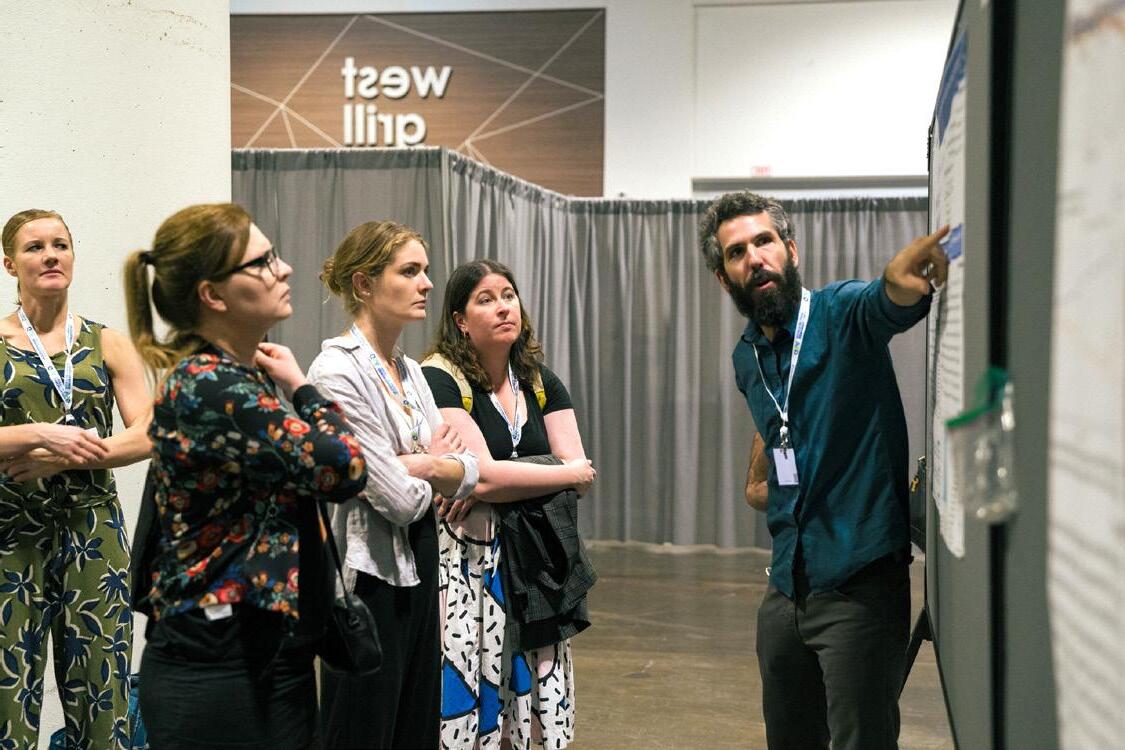


your research at GSA 2024!
Share
GSA2024.org


















